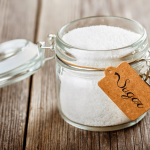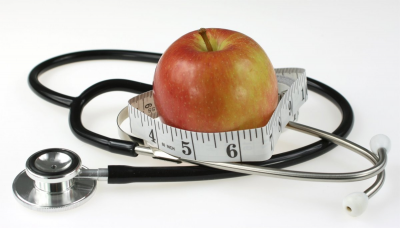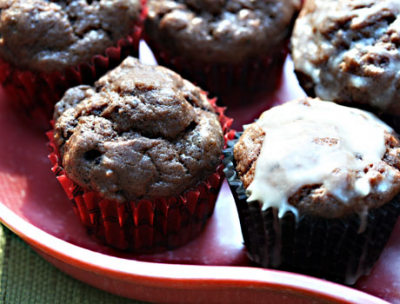Written by UConn Dietetics Student Natalie Cyr
 What are artificial sweeteners?
What are artificial sweeteners?
Artificial sweeteners are synthetic, or man-made sugar substitutes, and can be made from naturally occurring substances, such as herbs or sugar itself. These types of sweeteners are known to be more intense versions of sugar — meaning, they tend to be 50-200x sweeter than table sugar1.
Artificial sweeteners are found in a variety of food and beverages marketed as “sugar-free” or “diet,” mainly soft drinks and baked goods. They can be useful alternatives for some who should avoid regular sugar because they add no calories to your diet. Also, since these sweeteners are much sweeter than table sugar, you only need a fraction of them. Keep in mind, for some people, artificial sweeteners may leave an aftertaste, so when deciding to use, different types or combinations may be appealing to you.
Sugar substitutes — natural vs. artificial
 The topic of sugar substitutes can be confusing. This is mainly due to confusing, and at times, misleading terminology and labeling. Sugar substitutes are sweeteners that you use instead of regular table sugar. Artificial sweeteners are just one type of sugar substitute. Natural sugar substitutes are often promoted as “healthier” options to artificial sweeteners, but their vitamin and mineral content isn’t significantly different. Your body breaks down honey or maple syrup the same way it breaks down table sugar2. It’s okay to choose a natural sweetener due to taste preference in a drink or recipe rather than for any health claims, as there is no inherent difference between the two to your body. And remember, always try to use added sugars in moderation.
The topic of sugar substitutes can be confusing. This is mainly due to confusing, and at times, misleading terminology and labeling. Sugar substitutes are sweeteners that you use instead of regular table sugar. Artificial sweeteners are just one type of sugar substitute. Natural sugar substitutes are often promoted as “healthier” options to artificial sweeteners, but their vitamin and mineral content isn’t significantly different. Your body breaks down honey or maple syrup the same way it breaks down table sugar2. It’s okay to choose a natural sweetener due to taste preference in a drink or recipe rather than for any health claims, as there is no inherent difference between the two to your body. And remember, always try to use added sugars in moderation.
Are artificial sweeteners bad for you?
Artificial sweeteners are regulated by the Food and Drug Administration (FDA). They are reviewed through lab testing and approved before being put on the market. According to the National Cancer Institute and other national health agencies, there is no sound or definitive scientific evidence that any of the artificial sweeteners approved for use in the United States cause cancer or other serious health problems3. There have been numerous studies conducted throughout the years to confirm that the use of artificial sweeteners is safe, even for pregnant women3.
 Why choose artificial sweeteners?
Why choose artificial sweeteners?
Artificial sweeteners come with a variety of benefits that regular table sugar does not provide. Artificial sweeteners do not contribute to tooth decay and can help with weight control, since they have no calories. For comparison: a teaspoon of regular sugar has 16 calories vs. artificial sweetener with 0 calories. A can of regular soda has around 10 teaspoons of sugar – 160 calories! – while diet soda uses a fraction of artificial sweetener which adds 0 calories. However, it is important to keep in mind that food marketed as sugar-free isn’t calorie-free. Processed foods, which often contain sugar substitutes, generally do not offer the same health benefits as whole foods, such as fruits and vegetables and whole grains. If you have been diagnosed with diabetes, artificial sweeteners generally do not raise blood sugar levels. Ask your doctor or dietitian before using any sugar substitutes.
Check out this yummy sugar-free muffin recipe!
Sugar-Free Colombian Cocoa Muffins
Yield: 36 mini muffins
 Ingredients:
Ingredients:
- 1-1/2 cups unbleached all-purpose flour
- 1-1/2 cups Splenda for baking
- 1 Tbsp baking powder
- 1/4 cup Dutch-processed cocoa powder
- 1/2 tsp kosher salt
- 3 large eggs
- 2/3 cup nonfat (skim) milk
- 1/2 cup (one stick) butter, melted (I do this in the microwave)
- 1 tsp pure vanilla extract
- 1/4 cup Confectioner’s sugar (optional)
- 1 Tbsp brewed coffee (with or without milk)
Directions:
- Preheat the oven to 375°F, and line two mini-muffin pans with paper liners (or spray with baking spray).
- In a large bowl, combine the flour, Splenda, baking powder, cocoa and salt.
- In a medium bowl, beat together the eggs, milk, melted butter and vanilla extract. Add the egg mixture to the flour mixture, and stir just until the dry ingredients are moistened.
- Using a teaspoon, fill the muffin cups 2/3 full. Bake for 9 minutes, until a toothpick inserted in the center of one muffin comes out clean. Cool in the pan for 2-3 minutes, then turn out onto a cooling rack set over a baking sheet or paper towels.
- To make the (optional) icing, whisk together the Confectioner’s sugar and coffee, until there are no sugar lumps. With a spoon, drizzle the icing over the muffins.
Citations:
- https://www.mayoclinic.org/healthy-lifestyle/nutrition-and-healthy-eating/in-depth/artificial-sweeteners/art-20046936
- https://www.health.harvard.edu/blog/artificial-sweeteners-sugar-free-but-at-what-cost-201207165030
- https://www.cancer.gov/about-cancer/causes-prevention/risk/diet/artificial-sweeteners-fact-sheet
- https://www.theperfectpantry.com/2010/10/artificial-sweetener-recipe-sugar-free-colombian-cocoa-muffins.html
This material was funded by USDA’s Supplemental Nutrition Assistance Program (SNAP).
This institution is an equal opportunity provider.